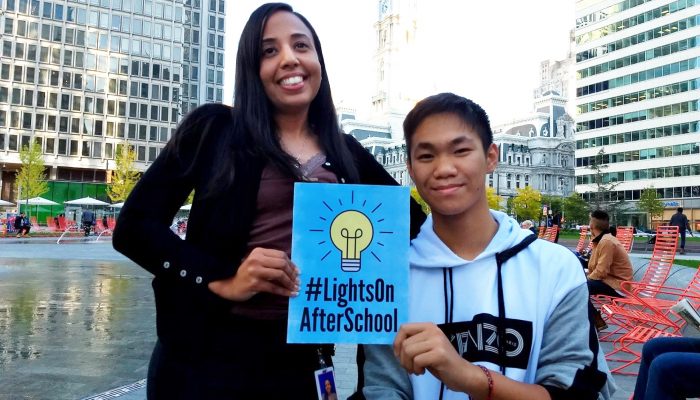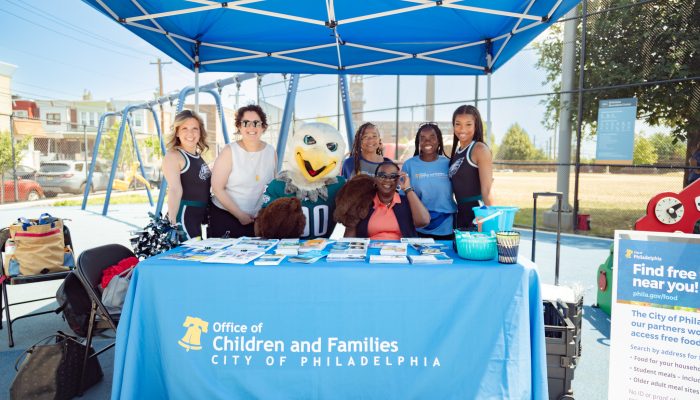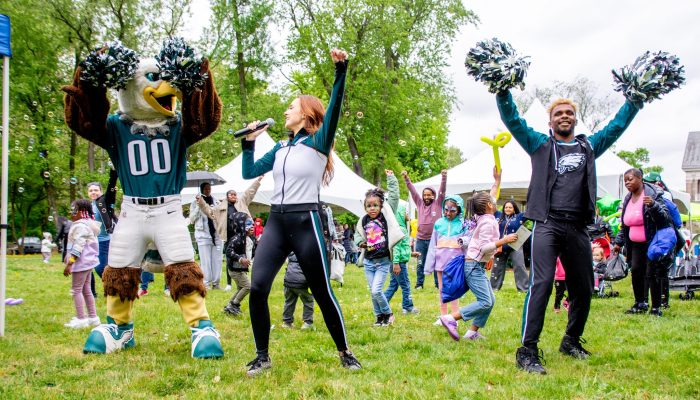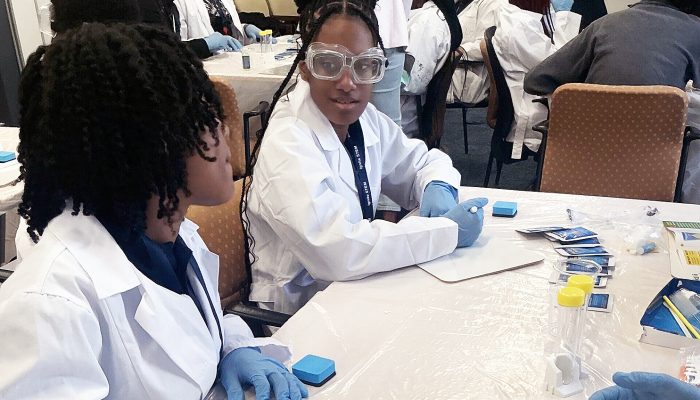Luz Ayala loves working with after-school programs. After studying to be a journalist, she spent years as a site director for a Philadelphia Out-of-School Time (OST) program. That’s where Luz met student Eric Nguyen, who was then in middle school. Luz is now an OST Program Liaison for Philadelphia Department of Human Services (DHS), working with 25 middle school sites across the city, assisting them in how to provide quality programming to youth.
This year, the City has made a $23M investment in the future of OST. DHS leads this effort by working with providers to build quality into OST programs, including using data to inform program improvement, supporting OST best practices through structured activities and workforce development, and increasing pay and hours for OST site staff.
From October 24 to November 1, Philadelphia will celebrate Lights on Afterschool, as part of a national movement to highlight the value of after-school programming. So we met up with Luz and her former student, Eric, in LOVE Park to hear their perspectives on why OST is so important.
Here’s what they had to say.
What are your favorite memories from being a part of OST?
Eric: A favorite memory of mine is when Ms. Luz planned out an entire lesson on detectives and how they would solve a crime scene. She even made a crime scene for the students to try and I was the only one to solve the crime scene (no one believed me).
Luz: I have countess favorite memories, but Eric and I do share the CSI project that I created as a favorite memory. For that project, the students explored the different methods and topics in forensic science—such as blood, fingerprints, handwriting analysis, ballistics, impressions, anthropology, and entomology. I hope that I can inspire my sites to create fun projects that explore career exposure.
Why do you think OST is important for young people?
Eric: I think that OST is important to young people because it allows them to be able to get out of their comfort zone, meet new people, learn new things, and have fun outside of school.
Luz: OST programs allow youth to experience activities that they might not otherwise experience. And in OST, programs have the freedom to educate youth in unique, hands-on ways. At DHS, we are promoting literacy for elementary school OST, career awareness and high school application prep for middle school, and career planning for high school OST, but how programs meet those goals can happen in many different and exciting ways.
Tell us about your OST experience.
Eric: I’m in the 10th grade attending Central High School. My OST experience has been the best, but it took a lot of hard work to get to where I am now. Some OST activities I participate in now are Philadelphia Futures – Sponsor a Scholar, I am planning to join its new chess club and robotics club, and I’m a part of the Young Men’s Initiative council there as well.
I also take part in PSTV located at the School District of Philadelphia. It’s a program that allows students to take classes in photography, music production, and many more artistic opportunities. I took their Logic Pro class, production class, and I‘m currently taking their photography class. And I’m also a part of SMASH Wharton which is a three-year program that allows students to live on the University of Pennsylvania campus and take classes there over the summer.
Luz: For six years, I worked as a middle school OST Director for a DHS-funded OST provider at a site located in East Kensington. Prior to that I worked part-time as a group leader in an OST program while studying to be a journalist — but I fell in love with working with youth and OST programming and it changed my career goals.
Luz, How was it seeing your former student again?
Luz: Seeing any former student is like seeing a child of mine. I spend countless hours working with them on a personal level, listening to them, assisting them with school, and participating in activities together. It brings me joy to see them and to see them so happy to see me as well.
Out-of-School Time (OST) is before, after-school, and summer programming for children and youth. What happens between the hours of 3 and 6 p.m. can have a drastic impact on the lives of children and youth, especially in our most vulnerable neighborhoods. OST programs keep kids from harm and allow them to explore passions, build creativity and support learning.




